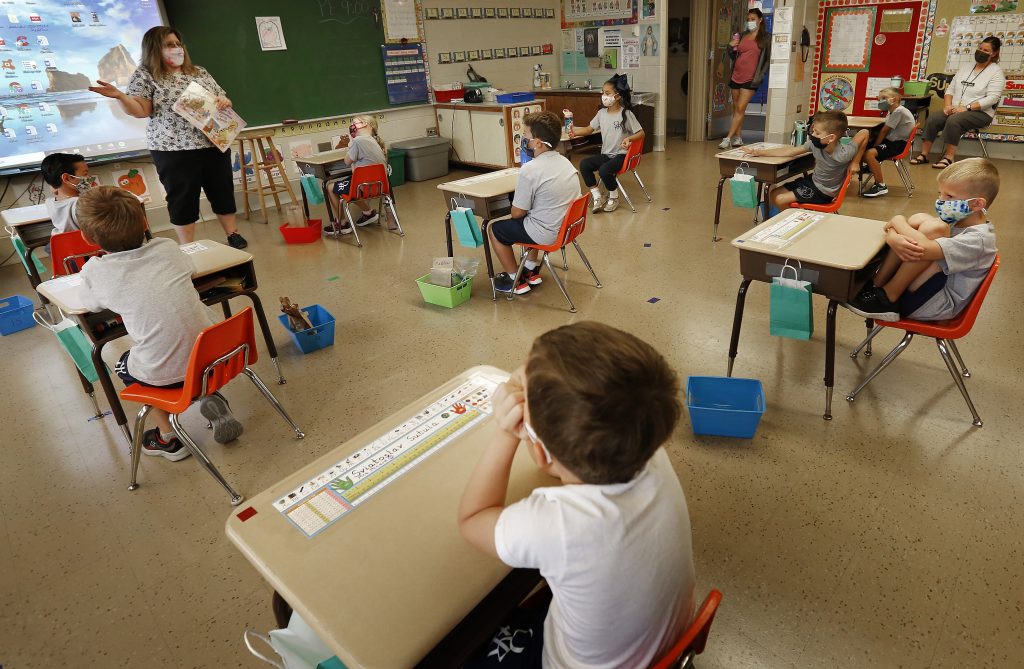For wary Catholic parents trying to navigate modern culture, raising children can feel a lot like a trip to the beach.
The current trend, the latest fad, the newest thing sweeps through our lives, sometimes just barely perceptible but at other times threatening to pull us out to sea. Children, in their vulnerability, play innocently in the sand among small waves, unprepared for a surge that might suddenly tower over them.
In 2022 America, it’s an apt metaphor to describe the struggle playing out over the way sexuality is taught in many schools. In a nutshell, today’s version of sexual ethics has been reduced to the question of “consent.” Once that is resolved, all options are presented as being on an equal footing and worth exploring without constraints, guilt, or shame.
It’s a philosophy that’s vastly incomplete — and in many cases, distorted — in comparison to the Christian understanding of sex, a profound and life-giving act so precious that it is reserved for sacramental marriage between two loving, committed spouses.
But leaving privately held religious beliefs aside, isn’t there something inherently troubling about introducing such a sensitive subject to kids in the classroom? Call it paternal instinct or common sense, but something tells us as adults that a child’s innocence is delicate and worth protecting. Likewise, we feel a duty to protect their futures from guaranteed dead ends.
For well-meaning and hard-working parents, the new sexual ethics poses a question: What if the “experts” — public health officials, school boards, and politicians among them — pushing for the new sex ed are right? Maybe they know better than us parents, busy as we are putting food on the table and tying laces, keeping cavities at bay and TV-watching to a minimum. For generations, haven’t we entrusted the teaching of subjects like algebra and U.S. history to school teachers, trusting those who set curricula and choose textbooks to know what our children ought to learn?
For all the seemingly religious certainty of those experts, our Catholic faith has a beautifully articulated alternative. Our Faith holds that parents are the first teachers of their children, and the family is the first school. In other words, parents are always the primary educators of their sons and daughters. In cases when teachers and coaches take on some of the burden of education, they do so “loco parentis” (“in place of a parent”).
The Compendium of the Social Doctrine of the Catholic Church explains this quite well. If we can understand the preeminence of the mother and father in the formation of their children, understanding the extent of our duties and responsibilities is easier. We can discern what we can delegate and what we can’t — and know what that delegation looks like. It certainly doesn’t look like handing our children over to the moral relativism and secularism of modern pedagogy — at least not without a fight.
Going up against the modern educational establishment seems daunting. More and more, parental input is often mistrusted and rejected, especially from parents who defer to deeply held moral and religious beliefs rather than a set of constantly changing human regulations. Nothing could be further from the Catholic idea of the educational rights of the family, in which parents should have the right to make ongoing decisions as principal educators.
What does reclaiming our parental duties look like in practice? In my own state of Florida, it’s taken the form of voter-driven efforts being made to restore parental rights in education. For example, there’s a proposal to make keeping vital information about their children from parents illegal.
In more traditionally progressive places like San Francisco, mothers and fathers have already had success in wresting some control back from agenda-driven school boards. These are parents working toward a return to the time when children went to school to gain knowledge, not be trained in ideologies.
There are different approaches to putting parents back in the driver’s seat where they belong. Sometimes parents have the means (and state support through “choice” programs) to choose a private or Catholic school with a safe curriculum. Others have the ability to home school. But not all do, and that’s why challenging our public schools — where the vast majority of children from Catholic families go to school — matters.
In all this, it’s important to remember something else that our Catholic tradition teaches us: By fulfilling its mission to educate, families play an indispensable role in advancing the common good of society. It is not only the parents of those children playing on the shore who should worry about the big, threatening wave: All of us depend on the integrity of the family unit, out of which society is built, and out of which emerge the kind of adults we want to build our future.

